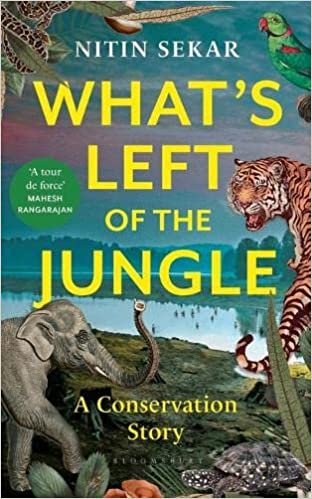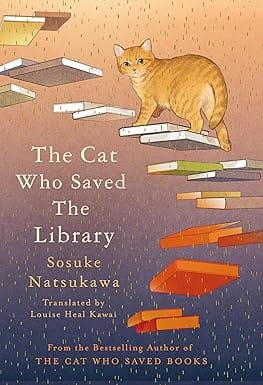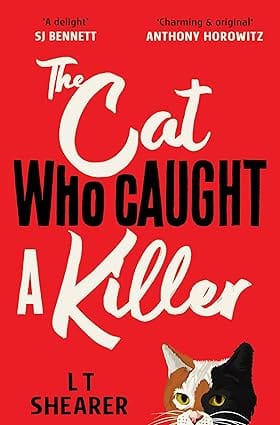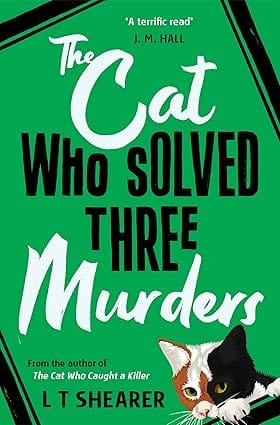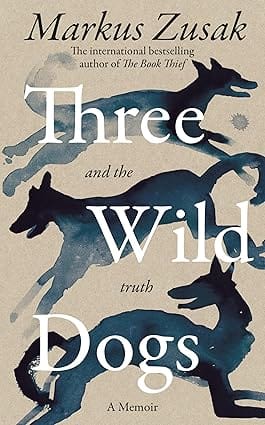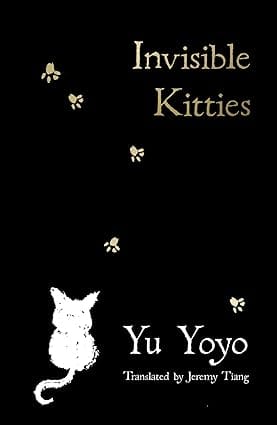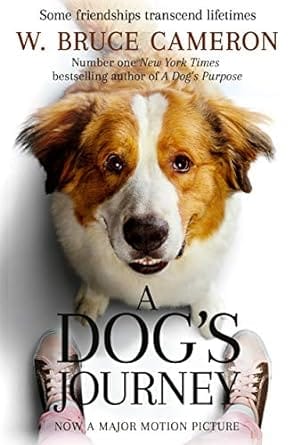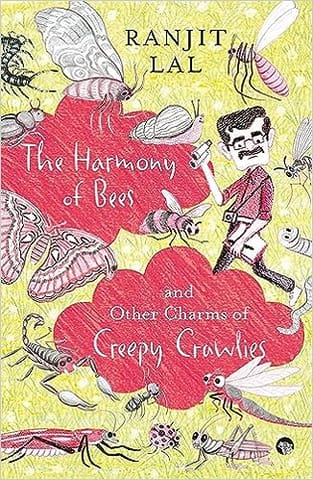- Contemporary Fiction
- Contemporary Fiction
- Children
- Children
- Comics & Graphic Novels
- Comics & Graphic Novels
- Non-Fiction
- Non-Fiction
- Fiction
- Fiction
Indian officials estimate that over half a million families lose crops or property to wild elephants a year. Akshu Atri, born and raised in Buxa Tiger Reserve, is one such victim. Elephants have destroyed his kitchen, regularly take over half of his annual crop yield, and have even killed some of his neighbours.
Akshu could hate elephants, but he doesn't - neither does his family nor most of their community. By telling Akshu's
story - of his childhood destitution, family tragedies, romantic pursuits, entanglements with poachers and smugglers, and his tumultuous rise out of poverty - What's Left of the Jungle unravels the complex affection that rural Indians have for jungle wildlife.
Akshu's story can help us understand both why some of the tropics' most crowded landscapes still host the world's most stunning wildlife - and what we might need to do to keep it that way.
Review
'Nitin Sekar has given us a tour-de-force of how the jungle's fate is interwoven with the myriad choices that individuals - and societies - make. India is for him a place of crisis and challenge, but also hope and renewal. In making spaces for nature - especially large but vulnerable organisms - we also win spaces of more meaning for humans. In a land where conservation is so fraught a mission, he finds ideas and endeavours that offer hope and direction.'
-- Mahesh Rangarajan - Environmental Historian and Vice Chancellor, Krea University'Nitin Sekar has written a fascinating tale of life in a Bengali village in the jungle, at the frontline of the human-wildlife conflict. His narrative shows why efforts to protect endangered animals will fail unless they take into account the complex needs of a growing human population. What's Left of the Jungle Book needs to be very widely read, not only in India but by everyone with an interest in conserving biodiversity.'
-- Peter Singer - Professor of Bioethics, Princeton University, and author of Animal LiberationSekar's heartfelt and beautifully-told story counters the commonly-held romantic Western narrative of indigenous people living in harmony with nature. Full of intrigue, deception, family loyalty and hardships, it offers a glimpse into the daily lives of the people who are the guardians of India's remaining wildlife and gives a much-needed dose of reality. It should be read by every well-meaning conservationist. -- Ruth DeFries - Recipient of the MacArthur Genius Grant and Professor of Ecology and Sustainable Development, Columbia University
'What's Left of the Jungle humanizes the people that sacrifice-invisibly, often involuntarily and generally without thanks-so that people around the world can enjoy the continued existence of majestic elephants and other species. Shining a light on these heroes and heroines gives their stories the power to inspire and transform conservation at a time when it is needed most. These are stories of deep empathy for both animals and the local people that make their continued co-existence possible.'
-- Paula Kahumbu - CEO of WildlifeDirect and Host of Wildlife Warriors, Winner of the 2021 Whitley Gold Award for Conservation'All of us love the idea of saving the world's last elephants, tigers, lions, and other dangerous animals, but very few of us have to live with them in our own backyards. With uncommon grace, wisdom, and wit, Nitin Sekar explores how villagers in rural India manage to do so. It's a touching and important story, beautifully told.'
-- David Wilcove - Professor of Ecology, Evolutionary Biology and Public Affairs, Princeton UniversityBook Description
About the Author
Nitin Sekar is a conservation scientist interested in human rights and animal welfare in wildlife conservation. His writings have been published in Science magazine, Economic and Political Weekly, The Guardian, and The Indian Express, and his research has been documented in The New York Times, The Washington Post and The Hindu. He has a PhD in ecology from Princeton University, and his technical work has been published in journals like Ecology, Journal of Ecology, and Conservation Biology. Nitin currently serves as WWF India's national lead for elephant conservation.
- Home
- Pets & Animal Care
- Whats Left Of The Jungle A Conservation Story
Whats Left Of The Jungle A Conservation Story
SIZE GUIDE
- ISBN: 9789354352218
- Author: Nitin Sekar
- Publisher: Bloomsbury
- Pages: 360
- Format: Paperback
Book Description
Indian officials estimate that over half a million families lose crops or property to wild elephants a year. Akshu Atri, born and raised in Buxa Tiger Reserve, is one such victim. Elephants have destroyed his kitchen, regularly take over half of his annual crop yield, and have even killed some of his neighbours.
Akshu could hate elephants, but he doesn't - neither does his family nor most of their community. By telling Akshu's
story - of his childhood destitution, family tragedies, romantic pursuits, entanglements with poachers and smugglers, and his tumultuous rise out of poverty - What's Left of the Jungle unravels the complex affection that rural Indians have for jungle wildlife.
Akshu's story can help us understand both why some of the tropics' most crowded landscapes still host the world's most stunning wildlife - and what we might need to do to keep it that way.
Review
'Nitin Sekar has given us a tour-de-force of how the jungle's fate is interwoven with the myriad choices that individuals - and societies - make. India is for him a place of crisis and challenge, but also hope and renewal. In making spaces for nature - especially large but vulnerable organisms - we also win spaces of more meaning for humans. In a land where conservation is so fraught a mission, he finds ideas and endeavours that offer hope and direction.'
-- Mahesh Rangarajan - Environmental Historian and Vice Chancellor, Krea University'Nitin Sekar has written a fascinating tale of life in a Bengali village in the jungle, at the frontline of the human-wildlife conflict. His narrative shows why efforts to protect endangered animals will fail unless they take into account the complex needs of a growing human population. What's Left of the Jungle Book needs to be very widely read, not only in India but by everyone with an interest in conserving biodiversity.'
-- Peter Singer - Professor of Bioethics, Princeton University, and author of Animal LiberationSekar's heartfelt and beautifully-told story counters the commonly-held romantic Western narrative of indigenous people living in harmony with nature. Full of intrigue, deception, family loyalty and hardships, it offers a glimpse into the daily lives of the people who are the guardians of India's remaining wildlife and gives a much-needed dose of reality. It should be read by every well-meaning conservationist. -- Ruth DeFries - Recipient of the MacArthur Genius Grant and Professor of Ecology and Sustainable Development, Columbia University
'What's Left of the Jungle humanizes the people that sacrifice-invisibly, often involuntarily and generally without thanks-so that people around the world can enjoy the continued existence of majestic elephants and other species. Shining a light on these heroes and heroines gives their stories the power to inspire and transform conservation at a time when it is needed most. These are stories of deep empathy for both animals and the local people that make their continued co-existence possible.'
-- Paula Kahumbu - CEO of WildlifeDirect and Host of Wildlife Warriors, Winner of the 2021 Whitley Gold Award for Conservation'All of us love the idea of saving the world's last elephants, tigers, lions, and other dangerous animals, but very few of us have to live with them in our own backyards. With uncommon grace, wisdom, and wit, Nitin Sekar explores how villagers in rural India manage to do so. It's a touching and important story, beautifully told.'
-- David Wilcove - Professor of Ecology, Evolutionary Biology and Public Affairs, Princeton UniversityBook Description
About the Author
Nitin Sekar is a conservation scientist interested in human rights and animal welfare in wildlife conservation. His writings have been published in Science magazine, Economic and Political Weekly, The Guardian, and The Indian Express, and his research has been documented in The New York Times, The Washington Post and The Hindu. He has a PhD in ecology from Princeton University, and his technical work has been published in journals like Ecology, Journal of Ecology, and Conservation Biology. Nitin currently serves as WWF India's national lead for elephant conservation.
User reviews
NEWSLETTER
Subscribe to get Email Updates!
Thanks for subscribing.
Your response has been recorded.

India's Iconic & Independent Book Store offering a vast selection of books across a variety of genres Since 1978.
"We Believe In The Power of Books" Our mission is to make books accessible to everyone, and to cultivate a culture of reading and learning. We strive to provide a wide range of books, from classic literature, sci-fi and fantasy, to graphic novels, biographies and self-help books, so that everyone can find something to read.
Whether you’re looking for your next great read, a gift for someone special, or just browsing, Midland is here to make your book-buying experience easy and enjoyable.
We are shipping pan India and across the world.
For Bulk Order / Corporate Gifting
 +91 9818282497 |
+91 9818282497 |  [email protected]
[email protected]
Click To Know More
INFORMATION
QUICK LINKS
ADDRESS
Shop No.20, Aurobindo Palace Market, Near Church, New Delhi

